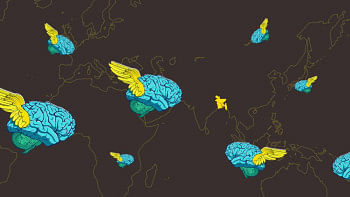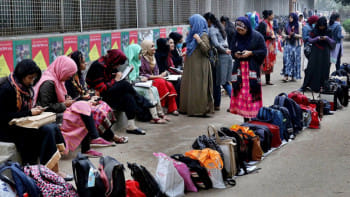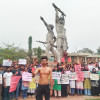Help our youth seize the window of opportunity

Having a larger working-age population is beneficial for an economy, and Bangladesh has entered such a phase. It is estimated that this window of opportunity will close by 2040. To achieve the highest possible level of economic growth during this time, engaging the youth is crucial.
According to the Bangladesh Bureau of Statistics' (BBS) Population and Housing Census 2022, the 15-24 years age group stood at 19.11 percent, while the 25-34 years age group made up 16.05 percent of the population. So, Bangladesh is in the phase of a demographic dividend as one-third of the country's population consists of the youth. According to the latest Labour Force Survey (2022), the youth labour force, aged between 15 and 29 years, stands at 36.53 percent of the entire labour force of 73.05 million. Of the total youth Not in Education, Employment, or Training (NEET), 47.6 percent are from rural areas and 52.4 percent are from urban areas.
Creating platforms for young researchers and innovators to showcase their work will create new business opportunities for them in the local as well as global market. Bangladesh also needs to invest more in research and development to foster a culture of innovation and continuous improvement. And, besides establishing transparent as well as accountable institutions, enhancing the youth's access to finance will help immensely to empower them.
For policymakers to understand young people's situation will be key to opening up the windows of opportunity for the youth. Shaping policies and processes could remove obstacles from the path of the youth and reduce their vulnerabilities. However, a recent study on the youth by Sanem and ActionAid highlights that the current education system is not meeting the demand of the market; as Bangladesh's spending on education is one of the lowest globally.
Youth from marginalised communities often find difficulty accessing finance from institutions to embark on entrepreneurship. Meanwhile, bribes and corruption reduce the youth's employment prospects and cause poverty. Many families of female youth are also unwilling to allow them to work outside the home, usually citing the harassment and torture of Bangladeshi migrant workers by foreign employers in Gulf countries.
In order to help the youth attain success, we need to provide them with policy, institutional, and procedural support. A recent survey of 6,273 youths in eight divisions, conducted by BRAC, found that most youths in the country envision owning businesses, followed by those who want to hold government jobs and private jobs, and be part of family businesses. Nonetheless, 3.5 percent of the respondents want to study abroad and return to Bangladesh after completing their education, while 1.9 percent want to settle abroad. Only 1.1 percent of the youth want to pursue higher education within the country. These opinions reflect the positivity of a thriving economy, but there is a need to create an environment where Bangladesh's youth can manifest their plans into reality without obstacles and pitfalls.
The BRAC study also shed light on the major societal constraints that hinder the youth in realising their potential. These, in order, are: corruption and bribery, an increase in food prices, unemployment, drug addiction, insecurity, and lack of quality education. The findings also suggest that lack of ideals or role models in society, not having the right direction for youth in society, absence of good cultural practices, cybercrime, and climate change are some of the pressing reasons causing disappointment in Bangladesh's youth.
Creative spaces are required for the youth to engage in extracurricular activities. These spaces will encourage youth to engage themselves in positive activities, constructive dialogues, learning, and sharing among peers, which can significantly reduce their frustration. Such creative spaces will also help reduce drug addiction and crimes among young people.
Access to and availability of quality education and skill sets is the most essential part of upholding the ability and dignity of young people at home and abroad. With rapid economic progress, the market has become competitive in all aspects, so that companies and institutions demand highly skilled employees. In the global market overall, skilled citizens perform better than semi-skilled or unskilled ones. The right skills and professionalism also reduces the risk of employees being exploited. Therefore, academic and training institutions need to ensure quality education for the country's youth.
Creating platforms for young researchers and innovators to showcase their work will create new business opportunities for them in the local as well as global market. Bangladesh also needs to invest more in research and development to foster a culture of innovation and continuous improvement. And, besides establishing transparent as well as accountable institutions, enhancing the youth's access to finance will help immensely to empower them.
Young people in Bangladesh, like in any other country, play a crucial role in the economic development and growth of the nation, particularly during this critical time period. The key is to create an enabling environment that empowers and supports the youth to explore their potential, take risks, and contribute meaningfully to the economic and social development of the country. This involves collaboration among the government, private sector, and educational and training institutions. Transforming young people into valuable human resources will lead to a breakthrough for the country's economy on the global stage.
Rubayat Ahsan is a development practitioner, presently working as a Research Specialist in Brac.
Views expressed in this article are the author's own.
Follow The Daily Star Opinion on Facebook for the latest opinions, commentaries and analyses by experts and professionals. To contribute your article or letter to The Daily Star Opinion, see our guidelines for submission.

 For all latest news, follow The Daily Star's Google News channel.
For all latest news, follow The Daily Star's Google News channel. 











Comments